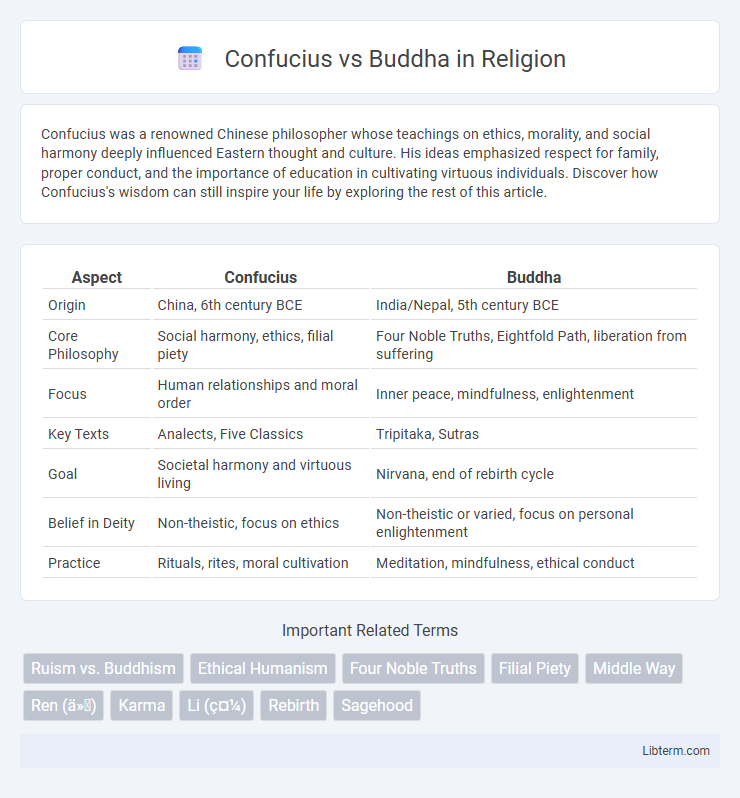Confucius was a renowned Chinese philosopher whose teachings on ethics, morality, and social harmony deeply influenced Eastern thought and culture. His ideas emphasized respect for family, proper conduct, and the importance of education in cultivating virtuous individuals. Discover how Confucius's wisdom can still inspire your life by exploring the rest of this article.
Table of Comparison
| Aspect | Confucius | Buddha |
|---|---|---|
| Origin | China, 6th century BCE | India/Nepal, 5th century BCE |
| Core Philosophy | Social harmony, ethics, filial piety | Four Noble Truths, Eightfold Path, liberation from suffering |
| Focus | Human relationships and moral order | Inner peace, mindfulness, enlightenment |
| Key Texts | Analects, Five Classics | Tripitaka, Sutras |
| Goal | Societal harmony and virtuous living | Nirvana, end of rebirth cycle |
| Belief in Deity | Non-theistic, focus on ethics | Non-theistic or varied, focus on personal enlightenment |
| Practice | Rituals, rites, moral cultivation | Meditation, mindfulness, ethical conduct |
Introduction to Confucius and Buddha
Confucius, a Chinese philosopher born in 551 BCE, emphasized ethics, social harmony, and proper conduct, shaping Confucianism as a guide for personal development and government. Buddha, Siddhartha Gautama, born in the 6th century BCE in India, founded Buddhism by teaching the path to enlightenment through the Four Noble Truths and the Eightfold Path. Both figures profoundly influenced Eastern philosophy and spiritual traditions, yet Confucius focused on societal order while Buddha concentrated on individual spiritual liberation.
Historical Backgrounds
Confucius, born in 551 BCE in the state of Lu during China's Zhou Dynasty, developed his teachings in a period marked by political fragmentation and social upheaval, emphasizing social harmony, ethics, and proper conduct. Buddha, Siddhartha Gautama, emerged in the 5th to 4th century BCE in ancient India, during a time of religious questioning and social stratification, founding Buddhism with its focus on enlightenment, suffering, and the path to liberation. Both figures profoundly influenced their respective cultures, shaping Chinese Confucianism and Indian Buddhism with distinct historical contexts and philosophical goals.
Core Philosophies Compared
Confucius emphasized social harmony through ethics, family loyalty, and righteous conduct, advocating for duty within hierarchical relationships. Buddha's teachings centered on the Four Noble Truths, focusing on personal enlightenment by overcoming desire and suffering through mindfulness and meditation. Both philosophies seek individual and societal well-being but differ fundamentally in their approach to self, morality, and spiritual goals.
Views on Human Nature
Confucius viewed human nature as inherently good but believed moral development required proper education and social rituals to cultivate virtue and harmony. In contrast, Buddha regarded human nature as characterized by suffering and ignorance, emphasizing the need to overcome attachment and desire through enlightenment and self-discipline. Both philosophies offer distinct perspectives on human nature's potential and the path to achieving personal and societal balance.
Ethical Teachings: Confucianism vs Buddhism
Confucianism emphasizes ethical teachings centered on filial piety, social harmony, and the cultivation of virtues such as righteousness, benevolence, and propriety, aiming to create a well-ordered society through moral education and respect for tradition. Buddhism focuses on ethical conduct through the Four Noble Truths and the Eightfold Path, encouraging self-discipline, compassion, non-attachment, and mindfulness to achieve liberation from suffering and cycle of rebirth. While Confucian ethics prioritize social roles and responsibilities, Buddhist ethics emphasize individual spiritual development and the alleviation of universal suffering.
Approaches to Society and Governance
Confucius emphasized a hierarchical social order based on filial piety, moral virtues, and proper rituals to maintain harmony and effective governance. Buddha focused on individual enlightenment and compassion, advocating for a society free from suffering through ethical conduct and mindfulness rather than strict social hierarchies. Confucianism supports structured state governance with rulers as moral exemplars, while Buddhism encourages personal transformation as the foundation for societal well-being.
Concepts of Spirituality and the Afterlife
Confucius emphasized ethical living, social harmony, and ancestral reverence without a detailed doctrine on the afterlife, focusing on cultivating virtue in this life. Buddha taught the Four Noble Truths and the cycle of samsara, highlighting liberation from suffering through enlightenment and rebirth cessation (nirvana). While Confucian spirituality centers on societal order and moral conduct, Buddhist spirituality deeply explores inner transformation and transcendence beyond material existence.
Influence on East Asian Cultures
Confucius shaped East Asian cultures through his emphasis on social harmony, filial piety, and hierarchical relationships, deeply influencing governance, education, and family values in China, Korea, and Japan. Buddhism, introduced from India via the Silk Road, transformed spiritual practices by promoting concepts like enlightenment, karma, and reincarnation, integrating with local customs across East Asia. Both philosophies contributed to ethical frameworks and cultural traditions, creating a dynamic interplay between Confucian social order and Buddhist spiritual insight in the region.
Enduring Legacy and Modern Relevance
Confucius' teachings emphasize social harmony, ethical governance, and familial respect, profoundly shaping East Asian political systems and educational philosophies for over two millennia. Buddha's legacy centers on personal enlightenment, mindfulness, and compassion, influencing global spiritual practices and mental wellness movements in contemporary society. Both figures inspire modern cultural values and ethical frameworks, reflecting enduring relevance in diverse social, philosophical, and religious contexts.
Conclusion: Key Similarities and Differences
Confucius and Buddha both emphasize ethical living and the cultivation of virtue, but Confucius focuses on social harmony and proper relationships within society while Buddha centers on individual enlightenment and overcoming suffering through detachment. Their teachings share an emphasis on compassion and self-discipline, yet Confucianism stresses filial piety and ritual, whereas Buddhism prioritizes meditation and the Four Noble Truths. Understanding these distinctions highlights how Confucianism shapes social order and Buddhism guides personal spiritual liberation.
Confucius Infographic

 libterm.com
libterm.com